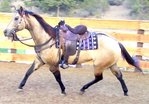
I find this article interesting, the horse involved was aptly named "You Reap what you Sow." In no way do I think this jockey deserved his fate, in fact I am saddened by his death. He probably went to work every day; starving, injured, uninsured, and under payed. The name is ironic and directed at the failure of racing commissions across the country to better regulate the industry. In most cases, jockeys ride without health insurance. If they are injured, they continue to ride because they need the money. I personally know some that have ridden with broken feet and fractured vertebrae. I have always felt the jockey weights, 105 for TB and 110 for Quarters, promotes sanctioned starvation. When you watch the big races, the Kentucky Derby, the Belmont, the Preakness; remember the jockeys not finishing in the money walk away with $50 in their pockets. Most of the time it is $25. It is sad what the industry does to it's heroes, the horses and the jockeys. In the end, both seem to end up injured, crippled, or dead.
Here is the story about what happened on Sunday.
The Oklahoma Horse Racing Commission is investigating the death of a Texas jockey, Mark Pace, who was thrown from his horse during race at Blue Ribbon Downs in Sallisaw over the weekend.
Racetrack general manager Blaine Storey said Mark Pace, 58, died Sunday after falling off his horse, Reep What You Sow, during the first race. The horse, a 60-1 long shot, hit the rail on the backstretch, lost its jockey and did not finish.
The track ran a second race, but after other jockeys learned of Pace's death, they asked that the rest of the card be canceled.
Choctaw Nation of Oklahoma, which owns the eastern Oklahoma track, said more information would be available later Monday.
According to Darrell Haire, the western region manager for The Jockeys' Guild, Pace is the fourth rider to die in an Oklahoma race since 1940, when the guild began keeping records. Three of the deaths have come at Blue Ribbon Downs.
Haire said 150 jockeys have died in riding accidents in North America since 1940.
The race in which Pace was riding was a 5½-furlong maiden claiming race for fillies and mares 3 years and older with a purse of $5,000.
"I didn't actually know the guy, but nonetheless, he was a jock who was a part of the colony and anytime anything happens to one of them, it strikes close to home and it gets you thinking," said longtime jockey G.R. Carter. "This profession, it's not a matter of if you get hurt, it's when and how bad. We all know the chances are there."

4 comments:
Yet another thing that is very "wrong" with the horse racing industry. Very sad!!
I've got to agree with you. There should be some sort of regulations and insurance for the jockeys. The owners spend millions of dollars on their horses and yet care nothing for the jockeys because there's always someone else waiting to ride. It's very sad how they are treated.
Awful. Simply awful treatment of both humans and horses.
Thank you for bringing it forward.
This is very sad. I admit I never thought about jockeys and health insurance before; that's a travesty too.
Post a Comment